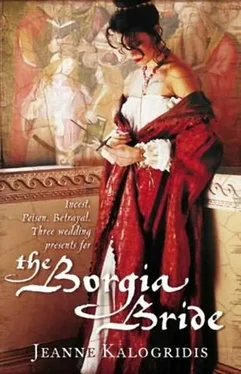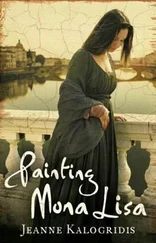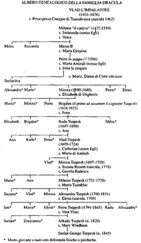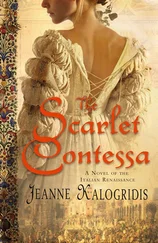Jofre gaped at me with open lust; I was at once flattered and jealous, for his reaction reminded me of all the whores he had taken during our marriage. I stifled my anger and proffered him my arm.
‘Let us walk together, Don Jofre,’ I said coyly. ‘I am of the mood to take the night air of Saint Peter’s piazza.’
He tried to smile, but was too sick with fear; I noticed that he carried his dagger that night, sheathed at his hip, in case our efforts again failed. I held his arm tightly, comfortingly, as we walked out of the unguarded, silent Castel Sant’Angelo.
Given the gravity of what I was about to do, my senses had the peculiar keenness I had experienced during madness: each step Jofre and I took rang and echoed with excruciating intensity. There were few passers-by on the bridge, no doubt because most were at home, afraid of the crime and unrest prompted by the death of a pope. I watched the faint lights from the palazzos and the boats play off the dark waters of the Tiber; never had it smelled so swampish and foul, so redolent of a decade’s worth of rotting flesh.
Once we crossed the bridge, we entered Saint Peter’s square. The year I had come to Sant’Angelo-the year of Jubilee-it had been filled to overflowing with pilgrims; now it was empty, save for a few stragglers.
My heartbeat quickened as we approached the Vatican gates, where tired, surly-looking young soldiers eyed me warily; there were fewer now than there had been at morning. My grip on my fan tightened; I held it closer to my face. But upon recognizing Jofre, the guards immediately bowed and opened the gates without a challenge.
For the last time I ascended the steps to the papal palace.
It pained me to move through those familiar halls; the air was heavy with treachery and grief. When I entered the Borgia apartments, the surfeit of gilding and decoration no longer seemed breathtaking or glorious, but sinister.
I passed the Hall of the Sibyls, scrubbed clean of blood and restored to its previous luxury since I had last seen it; I averted my eyes, and summoned all the coldness in my heart.
‘In here,’ Jofre said, and led me to the Room of the Saints, the scene of much celebration. Now it had been turned into a hospital of sorts. A great bed with a canopy had been brought in; tables held basins of water and cloths, as well as flasks of water and wine, a goblet, and medicines. True to Jofre’s word, Alexander had been abandoned save for Gasparre, who sat sleeping in a chair at the pontiff’s bedside.
In the middle of the bed-beneath the brilliantly coloured fresco of Lucrezia as the sagacious Saint Catherine-lay the Pope. His skullcap had been removed, revealing a bald crown and a fringe of dishevelled white hair as fine and downy as an infant’s. He wore only a linen nightgown; sheets had been drawn up to cover his spindly legs and half his round, protruding stomach. He too dozed, though his eyes were slit open; the lids were puffed and blackened; his complexion was grey, and his cheeks sunken, giving him a skeletal appearance.
I let go of Jofre’s arm. He went over to Gasparre, put a hand on his shoulder to rouse him, then whispered something in the startled chamberlain’s ear. I know not what he said; I was only grateful that my husband’s lie worked, for Gasparre rose and left the room.
I turned to Jofre. ‘Husband,’ I said. ‘Perhaps it would be best if you went, too.’
‘No,’ he replied firmly. ‘I will see you safely out of here.’
I went over to the table and set down my fan, then poured a small amount of wine into the goblet. While Jofre watched the entrance, I withdrew the green vial, and poured half its contents into the liquid, then swirled it. It was a massive dose, enough for fifty men, but though I was cold enough to commit murder, I was not cruel. I desired that Alexander go quickly, not that he suffer.
When I was satisfied it was ready, I nodded to my husband.
He moved away from the door, sat on the edge of his father’s bed, and put a gentle hand on the old man’s arm. ‘Father,’ he said.
Alexander’s eyelids flickered; he gazed up at his averred son in confusion. ‘Juan?’
‘No, Father. It is I, Jofre.’ Tears gathered in my husband’s eyes; his face contorted with sudden grief. Holding the goblet, I moved behind him.
Alexander blinked and recognized me at once despite the mask that hid the upper half of my face. ‘Sancha?’ His voice was weak, reedy, but held a trace of good humour; he seemed pleased to see me. ‘Sancha, you have come to visit…Is it the season for Carnival already?’ It was as though he had forgotten my brother’s murder and my imprisonment. He spoke to me as he would have to Lucrezia, seeking feminine comfort. ‘Sancha, where is Juan?’
I stepped in front of my husband. ‘He sleeps, Holiness. As you should, too. Here. This will help.’
I held the cup to his lips; he drank, coughing at first, but then recovered, and managed to take several swallows. As I pulled the goblet away, he grimaced. ‘It is bitter.’
‘The most efficacious medicines always are,’ I replied. ‘Now rest, Your Holiness.’
‘Tell Jofre to stop that crying,’ he said peevishly, then sighed and closed his blackened eyelids.
With the back of my hand, I reached down and stroked his weathered cheek. The skin was soft, thin as parchment.
I sighed, too, and with the outflow of breath came a long, piercing pain in my breast, like someone withdrawing a sword. I knew then that I need accomplish no more: the canterella and I had both served our purpose.
‘It is done,’ I whispered to Jofre. ‘Without him, Cesare has no power. We can go.’
But Jofre took the sleeping pontiff’s hand and said, ‘I will stay with him.’
I kissed his head in reply, and left him there. I had intended to return at once to the Castel Sant’Angelo…but strangely, my feet sought a familiar path, up the stairs, on a journey I had made surreptitiously, at night, so many years before-to Cesare’s apartment.
The doors to both the inner and outer chambers were open. I kept the fan close to my face; I expected to confront Micheletto Corella there, and had prepared the alibi that I was a courtesan friend of Cesare’s, so enamoured of him that I had to reassure myself he would recover.
But the suite was empty, save for the man upon the bed. Corella, fittingly, had deserted his master.
Cesare was naked and moaning, his long legs and torso tangled up in the linens; his feet were dark purple, swollen to almost twice their normal size. A single taper burned on the nearby table, but even that feeble light pained him; he squinted and clutched his head in agony.
I entered silently and stood before the bed, uncertain why I had come. I had never seen the man so helpless, or deserted; either servants or Corella had taken advantage of his condition, for his tapestries, fur rugs and gold candelabra were all missing. Any item of value, in fact, had been taken; only the gilded ceilings and frescoes remained. Yet I felt no pity…only amazement that I had ever loved a man so wicked, amazement that I had been so fooled.
At last his tortured gaze-black, shadowed eyes in a ghastly white face, framed by dark hair hanging in damp, tangled strands-fell on me. He struggled to cover himself, to regain some dignity despite his weakness; he tried to lift his head and failed. I understood why it was not necessary to kill him: it was greater torment for him to survive, stripped of power. Without the backing of the papacy, none would remain loyal to him. With his cruelty, his treachery towards his own men, he had hanged himself-just as surely as King Alfonso II had swung from the great iron sconce in Sicily.
‘Who are you?’ he rasped.
I spoke from behind the fan, my voice muffled. ‘You are undone,’ I told him. ‘Your father is dead.’
Читать дальше
Конец ознакомительного отрывка
Купить книгу












